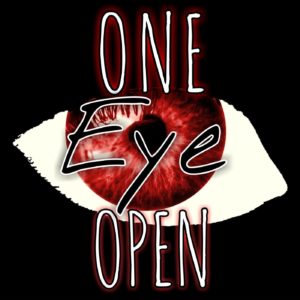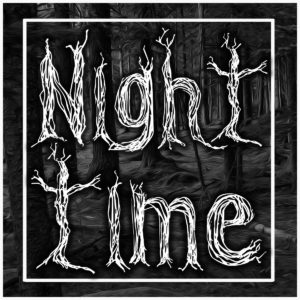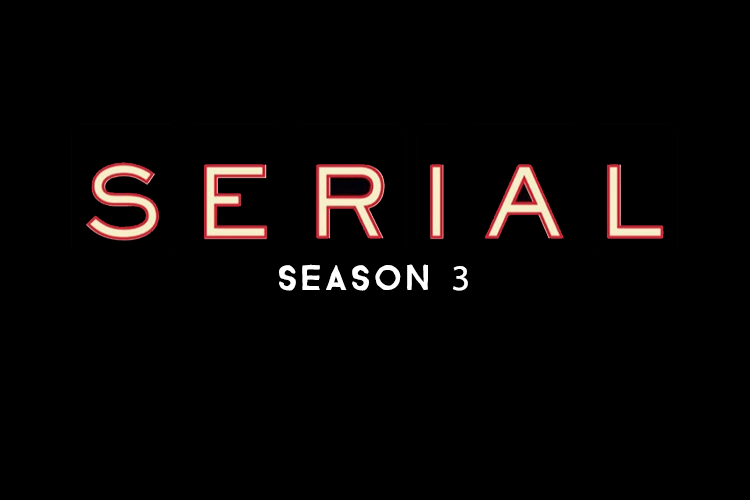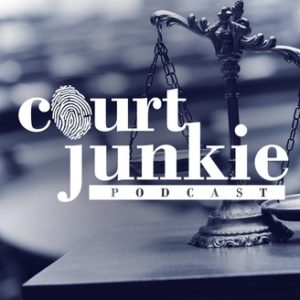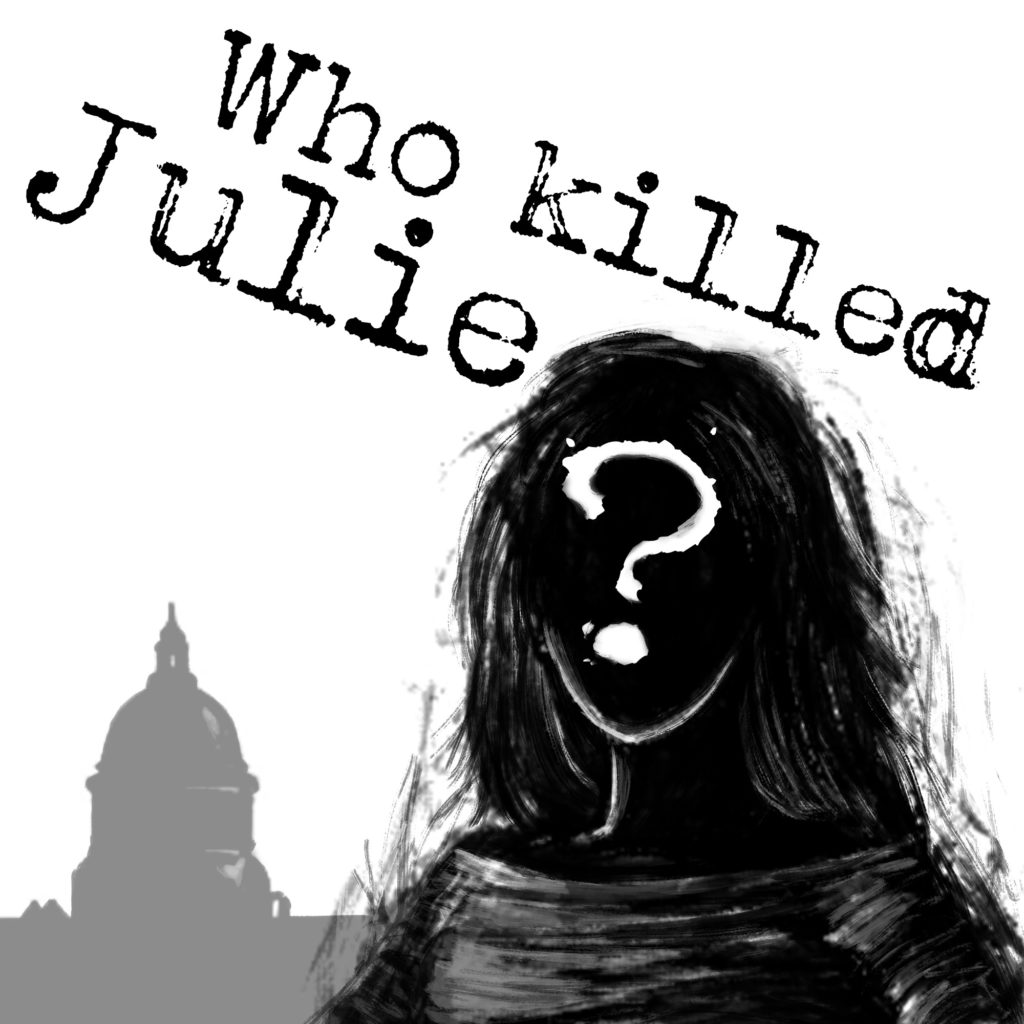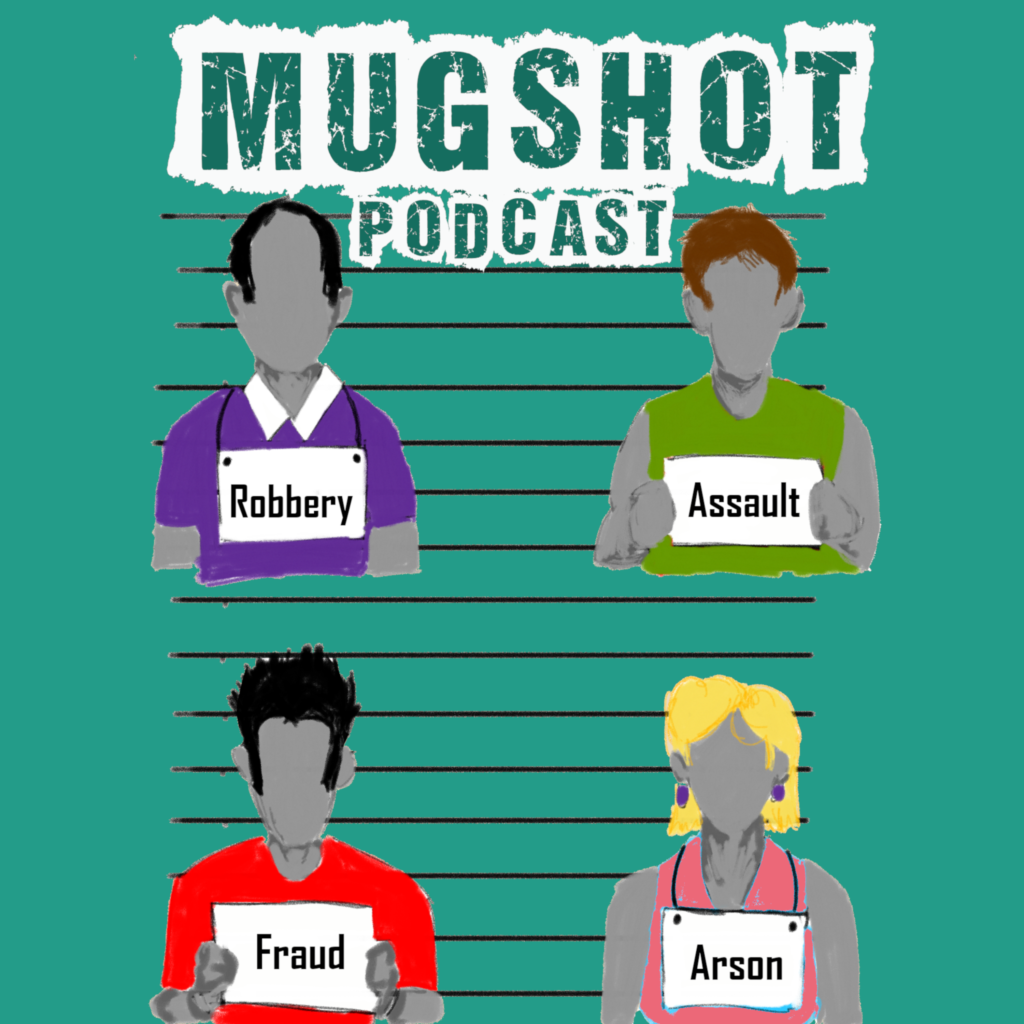Fall is officially here, a chill is sort of in the air, and it’s never been a better time to curl up with some headphones and listen to things that go bump in the night. But crime podcasting is about much more than jump scares and sleeping with the lights on—and this fall there’s a rich array of podcasts pushing the boundaries of what crime podcasts are, what they can and should do. But wait! you say. Real life is spooky enough! Which, let’s be honest, is fair. But isn’t variety the spice of life, and of spiked cider? Okay, maybe just life—I think with cider it’s nutmeg. But either way, go get the seasonal beverage of your choice, then come back and lend your ear to 13 frightening, affecting, incredible podcasts.
Very spiked cider: One Eye Open
One Eye Open is a brand-new podcast hosted by Stephy, the daughter of an English homicide detective. Stephy opens each episode with memories of her father or of other family members, going on to connect them—often very poignantly—with the case at hand. Even though Stephy literally grew up with crime, she is anything but hardened to it; she discusses her cases with thoughtfulness and empathy, weaving together first-hand sources, self-deprecating asides, cold gin and tonics, and sometimes even poetry (intentional or not). The result is a special hybrid of a podcast that can somehow be both extremely fun and emotionally devastating. Can I promise that you’ll hear absorbing narratives of lesser-known crimes from a warm, engaging host? Yep! Can I promise that some of these episodes won’t leave you trying not to noticeably cry while on public transportation? Nope! As Stephy herself says at the end of one episode, researching and writing that week’s case had her in tears. But these are real, human stories, after all—and especially at a time when it can be tempting to tune out and go numb, getting emotional might not be such a bad thing.
The stuff of hauntings: Happy Face
This fall will see the debut of another podcast driven by a daughter’s story—but this time, it’s the daughter of a serial killer. Melissa Moore was just a teenager when she got the stunning news that the man who had become known in the press as the Happy Face Killer, who murdered at least eight women before being caught, was her own father. Happy Face is anchored by Melissa’s investigation and narration, in a fresh twist on the true crime genre. As producer Noel Brown says in the podcast trailer, Happy Face is “really more about the way that crimes like this have ripple effects beyond the people who are hurt directly, and how it can affect people’s lives over a much longer timeline.” With its dreamy music, effective sound design, nimble storytelling, and near-gothic sense of atmosphere, Happy Face is a haunting listening experience—and, because it’s made by How Stuff Works, it’s also rigorously researched and skillfully constructed. The first episode drops on September 28th.
Stories around the campfire: Nighttime
Nighttime is a podcast focusing on strange and unusual stories from Canada—whether true crime, mystery, or the paranormal. Host Jordan Bonaparte discusses everything from UFOs to ghosts to missing persons cases, managing to maintain both a sense of wonder and a spirit of earnest inquiry. “As adulthood continues its assault on the magic and madness I’d like to believe exists in the world,” Bonaparte says in an introduction to his podcast, “I wanted to further surround myself with things that remind me that there’s still mystery out there, and that incredible things do happen.” With rigorous research and painstaking production, he certainly accomplishes that—while remaining aware that he often finds himself discussing real tragedy. Jordan’s episode on the murder of Pina Rizzi, which is centered around an interview he conducted with Rizzi’s niece, is a perfect example of the sensitivity, empathy, and willingness to step away from the microphone that can sometimes seem rare in podcasting, and which make Nighttime shine.
The extraordinary ordinary: Serial
Okay, here’s the part where I helpfully recommend the most famous crime podcast ever. But famous or not, Serial is back for a third season, and it’s honestly fantastic. For fans who loved Season 1 and felt a bit let down by Season 2, now is definitely time to tune back in; while Season 3 certainly isn’t a return to the original format, it’s easily as gripping as anything the podcast has delivered to date. Sarah Koenig and fellow reporter Emmanuel Dzotsi spent a year camped out in the Cleveland Justice Center, where they were granted incredible access to record pretty much whatever they wanted. And the Justice Center is where they stubbornly stay, no matter what occurs in it. Rather than one overarching look at an unusual story, the exception, Serial Season 3 is a collection of shorter stories about the rule. You’ll be reminded of the podcast’s This American Life roots as Koenig and Dzotsi hear from defendants, attorneys, judges, law enforcement, anyone and everyone who finds themselves in the Justice Center—to ultimately take an unflinching look at the American criminal justice system, in all its captivating, maddening, and deeply flawed glory.
Left in the cold: Unravel
Increasingly, Australian true crime podcasts are becoming a force to be reckoned with. Odds are that you’ve already listened to The Teacher’s Pet, which examines the swirl of intrigue around a young mother’s disappearance in Australia– but make sure you also listen to Unravel. Season 1, Blood on the Tracks, covers the mysterious death of 17-year-old Aboriginal boy Mark Haines, whose body was discovered on a cold night in 1988, draped across the train tracks of his hometown. Journalist Allan Clarke, who is Aboriginal himself, has been troubled by the Haines case for the past five years—and finds himself trying to balance professional restraint with personal investment. It’s not an easy task, since at every turn, Mark Haines’s case is steeped in the type of systemic racism that allowed police to shrug off his death, and which continues to make Aboriginal Australians feel invisible within their own country’s justice system. With the help of Mark’s fearless, irrepressible uncle, Clarke fights to finally find out what really happened to Mark that night, in a podcast that you may find yourself racing through in one afternoon. Which would be good timing, because Season 2 of Unravel—which follows the case of missing teenage hitchhiker Trudie Adams, all the way from the beaches of Sydney to the dens of police corruption and organized crime—comes out on October 9th.
Inquiring minds want to know: Jolted
This five-part podcast from Vermont Public Radio covers the fascinating story of a tragedy that didn’t happen. Just this past February, shortly after the Parkland school shooting, 18-year-old Jack Sawyer was arrested in Vermont for planning a mass shooting at his former high school. Jack’s plans were detailed; he’d thought everything through. He had a manifesto. He’d bought a gun. For all intents and purposes, he was stopped in the nick of time. Or was he? Jolted seeks to answer that question and more, first trying make sense of why Jack made the plans he did, and why he was arrested when he was. But Jolted also looks into the thorny legal and ethical implications of the case, which inspired sweeping gun control reforms from a Republican governor, but which also left many asking—when does a thought become a crime? Can someone go to jail for something they didn’t do? And if we can’t use the legal system to prevent crimes as well as punish them, how much is that system worth?
A sympathetic ear: Voice of the Victim
Ryan and Rosie, the married couple who host the Voice of the Victim podcast, make one thing clear: They do not enjoy discussing other people’s suffering. If it makes for upsetting listening, it also makes for upsetting telling. But they started Voice of the Victim, which focuses on criminal cases involving abuse, to spread awareness of what abuse can look like, and to help all of us spot warning signs and speak up—whether for someone else, or for ourselves. In a recent episode, Rosie shared her personal experience of abuse, which highlights just how harmful victim-blaming can be, especially when victims often blame themselves already. “It took me a long time for me to see myself as a victim,” Rosie told listeners. “But I don’t think that’s right—and I’m hoping that sharing this story with others with similar experiences will give them the nerve to speak up.” Even in cases we’d rather not think about, Ryan and Rosie have made speaking up their mission—and thank goodness for that.
The trappings of justice: Court Junkie
This is just speculation, but I fear that this fall may prove a frustrating time for some listeners of the remarkable Court Junkie podcast. As Serial returns, examining crime from the vantage point of the courthouse, Court Junkie will be doing kind of the same thing—as it has already been doing, for two years. But there’s nothing keeping you from listening to both podcasts, and it would absolutely be worth your time to do so. Jillian, the creator and host of Court Junkie, immerses herself and her listeners in the criminal justice system, digging into the legal side of crimes, in addition to the crimes themselves. She uses a wide array of sources±court records, police interrogations, interviews she conducts herself—to create gripping narratives not just of crime, but of the complicated tangle of what happens next. After all, the ending of one story is simply the beginning of another; and where most podcasts turn off the lights, Court Junkie keeps them on.
Razor-sharp conversation: RedHanded
I first wrote about RedHanded in my Mother’s Day roundup, when I discussed their 40th episode, “How Larry David Saved a Man from Death Row.” But as RedHanded continues to post first-rate content every week, this list would be incomplete unless I recommended adding the whole podcast to your autumn listening. Hosts Hannah and Suruthi, who recently made the Top 20 in the Listeners’ Choice category of the British Podcast Awards, bring a sense of clarity, honesty, and emotional tact to the world of true crime, with the type of bantery podcast that many attempt, but few manage so well. RedHanded is not only entertaining, but rigorously researched, sharply reasoned, socially aware, and conscious that any digressions shouldn’t derail the story, and should still be interesting to someone other than the hosts. Hannah and Suruthi’s episode on the murder of Stephen Lawrence is a must for anyone remotely interested in race politics and policing, and their discussion of the murder of Kim Wall contains one of the most incisive takes on rape culture, sexual objectification, and victim-blaming that I’ve heard in recent memory.
Nightmare fuel: Dr. Death
Dr. Death isn’t like other crime podcasts. It’s not the scary story of Jeffrey Dahmer, or Ted Bundy, or other monsters of legend: It’s scarier. While some podcasts can make crime feel like it’s at a safe distance, Dr. Death brings it one scalpel’s length away, disguised and repurposed as life-saving healthcare. Medical reporter Laura Biel works with Wondery, the production company behind last year’s Dirty John, to bring us the jaw-dropping true story of Christopher Duntsch: the charming neurosurgeon who killed or permanently maimed 33 of his patients before he was finally stopped. Biel’s unflinching descriptions of one disastrous surgery after another will leave you squirming, but perhaps even more disturbing is the limpid response from the hospitals who hired and enabled Duntsch, and who ultimately preferred to kick a can down the road rather than take a stand. With high production value, skillful interviews, and smart pacing, Dr. Death is absolutely terrifying—but it’s also an incredibly important story for us to remember, if we’re to have any hope of keeping it from repeating.
Chills up your spine: Who Killed Julie?
Who Killed Julie?, one of the most anticipated audio dramas of the year, tells the story of Julie Macklemore: an enigmatic young woman who vanished from Olympia, Washington in 2013, and whose body wouldn’t be discovered for another two years. In the tradition of podcasts like Tanis, Limetown, and The Black Tapes, Who Killed Julie? is a fiction podcast formatted like a non-fiction podcast, narrated by someone determined to unveil the truth. Investigator Emerald Johnson conducts a series of interviews with people who knew Julie, which reveal just how prismatic a human being can be; everyone who speaks to Emerald wants her to know “the real Julie,” but the real Julie is a different person for each one of them. So is Emerald herself, as she changes her interviewing style from abrasive to conciliatory, tactful to blunt, depending on the person she’s talking to, on what they need to hear. Though the podcast ostensibly deals with who killed Julie, the question it really asks is, who was Julie? Who were the people around her, and why did they turn her life into something she had to try and survive? With consistently strong writing and acting, spine-tingling music, and effective editing, Who Killed Julie? culminates into a gripping finale that will stay with you long after the final episode.
Crime with a Southern twang: All Crime No Cattle
All Crime No Cattle is a podcast devoted to true crime in Texas—which, as anyone who’s watched many episodes of I Survived can tell you, seems to be the setting for some of the most bizarre and shocking cases you’re likely to encounter. Texas natives Erin and Shea, who take turns telling each other about a different case every episode, situate each story in the Texas town where it occurred—describing the environment and cultural landscape of the area to paint a picture for their listeners, no matter where they’re from. Erin and Shea are also careful to list all the sources for their research up front, so that you know exactly how each story has been pieced together. The result is a polished, absorbing podcast that will you have hitting play and suddenly wondering where the past hour or two went. Both hosts are natural storytellers who don’t disguise their feelings, resulting in an honest, affable style that’s all their own.
Widening the frame: Mugshot
To put it bluntly, most true crime podcasts are about murder. There’s something endlessly fascinating to us about what can drive one person to try and erase someone else. But what about other crimes? What makes someone stalk a coworker, or fake their own death? What happens if a bank robber is also the policeman in charge of investigating his robberies? Mugshot is a new podcast exclusively devoted to answering questions like these, and to looking at crimes other than homicide. Lindsey, the host of Mugshot and co-host of the Corpus Delicti podcast, has a professional background in identifying financial crimes, which serves her well here. Every episode, she offers smooth and focused accounts of cases that remind us just how wide the range of human behavior can be, and how many different crimes can have a catastrophic impact.


